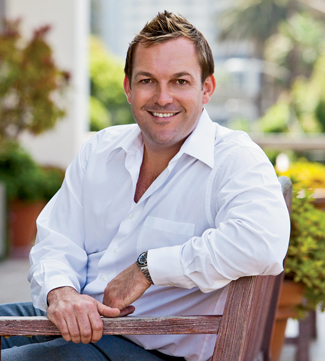
Thomas J. “T.J.” Hill aims to “obtain the greatest number of mental health services for the greatest number of people.” He works toward this great goal as mental health policy director at Los Angeles’ Association of Community Human Services Agencies. Hill also serves on the board of the American Civil Liberties Union (ACLU) of Southern California, which he calls “one of the most progressive in the country,” and as a commissioner on the City of Santa Monica Disabilities Commission. Through these activities, Hill, JD ’03, fulfills the “obligation that came out of law school and, even before that, the desire to give back as an active member of my community,” he says.
His accomplishments are impressive enough on their own. What further distinguishes him is that he reached this point despite lifelong learning disabilities. Although the diagnosis initially was not easy for him, he embraces it today. “My disability is as much of a benefit as a problem,” he says. “I approach problem-solving from a perspective that is indicative of my disability but also reflects how I see the world.”
As a third-grader, Hill couldn’t read and was diagnosed with dyslexia, dyscalculia, dysgraphia and attention deficit hyperactivity disorder. His teacher told his parents he would never finish high school. They rejected this prognosis. Hill’s father, Thomas Charles Hill, MD ’71, a doctor in Boston, experiences similar processing disorders, which remained undiagnosed during his childhood. Hill’s sister, Melissa, grew up with learning disabilities and cerebral palsy.
“Our family normalized disability,” Hill says. “We looked at it as a typical obstacle in life that was not going to limit our ability to pursue the career we wanted or any of our dreams.”
Hill enrolled in a school with a strong special education program. There, he learned to value his perspective but “present information the way my teachers expected me to,” he says. He later transferred to a college preparatory school before attending the University of Arizona, where he majored in psychology and minored in special education and rehabilitation.
After college, Hill designed community support programs for adults with developmental disabilities and traumatic brain injuries. But he became frustrated by his limitations as a service provider: “I wanted to do something more to impact policy development,” he says. “For me, law school provided the answer to that.”
Throughout his time at Washington University School of Law, Hill pursued his goal by focusing on public interest law and civil rights. At the local ACLU, subsidized by a Dagen-Legomsky Summer Public Interest Fellowship, he helped effect social change by working on civil rights cases involving discrimination, free speech and the death penalty. He served as a summer associate at Disability Rights Advocates, a public interest litigation firm in California’s Bay Area. Through the university’s Congressional and Administrative Law Clinic in Washington, D.C., he interned with Sen. Tom Harkin (Iowa), author of the Americans with Disabilities Act. Hill calls this internship inspirational, adding, “It pushed me to do my current policy work.”
While at the university, Hill met his partner, Jay Heiserman. Heiserman, now a television art director, moved to California after graduating from Webster University. Two years later, Hill followed him, initially working as a program director at Los Angeles’ Disability Rights Legal Center. Though he enjoyed the job, it renewed his desire to develop, rather than enforce, policy. That brought him to the Association of Community Human Services Agencies (ACHSA).
“It’s a great fit. I am filled with the same excitement that I had when I was in Washington,” he says. “Health care is a really interesting place to be right now, and mental health is a natural extension of my work with disability rights.”
Though he’s considered a future in policymaking or politics, it’s still an open question, he says. “I’ve only been at ACHSA for a year, and I don’t know where this position will take me.”
No matter where he ends up, however, Hill will continue to empower others with disabilities. In the meantime, he and Heiserman keep busy with work and community activities. “You find the time to do the things that really matter to you,” he says.
Beth Herstein, AB ’83, is a freelance writer based in New York City.
Comments and respectful dialogue are encouraged, but content will be moderated. Please, no personal attacks, obscenity or profanity, selling of commercial products, or endorsements of political candidates or positions. We reserve the right to remove any inappropriate comments. We also cannot address individual medical concerns or provide medical advice in this forum.